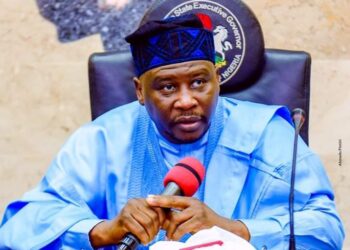The people of Adamawa state have landed themselves a better bargain by voting Governor Ahmadu Fintiri. This is in light of the man’s people-centred actions since President Bola Tinubu’s inauguration day announcement of the end of Nigeria’s long and tortuous fuel subsidy regime. The pronouncement has been described as the president’s singular most impactful action since taking over from erstwhile President Muhammadu Buhari. The fallout from that statement as well as other economic policies like the floating of the naira has visited Nigerians with hardship never before witnessed in the history of the country.
While analysts and economists continue to placate Nigerians with talks of a rosy future to come from president Tinubu’s bitter economic policies, the common Nigerian must bear the brunt of never-before-seen high food inflation, high cost of transportation, hunger amidst very poor healthcare, public transportation and other sundry services, all balling into a heavy fist of poverty tearing through the land.
The federal government and subnational governments have announced a rash of palliatives to cushion the biting effects of that policy. N5 billion non-interest loan to states and numbered trucks of grains for distribution to indigent Nigerians are some of the palliatives to states by the federal government. But whereas Nigerians in many states have been lamenting what they call pallia-thieves, a term used to refer to the alleged diversion of resources meant for the people by some governors and their lackeys, one governor who has taken the plight of his people very seriously is Governor Fintiri.
In a landmark move, Fintiri procured over 60,000 25kg bags of grains, mostly rice and maize. These are to be distributed to Adamawa citizens. The governor made it clear that only those truly in need will benefit from the grains. This is in addition to the grains that Adamawa, like all other states of the federation, received from the federal government. Leaving nothing to chance in ensuring that only those targeted for the initiative benefit, the state government set-up a 22-man representative committee with the mandate to oversee that grains are delivered only to the most deserving residents of the state.
Earlier, the governor revealed that a reduction to the work week is being considered as a measure towards cutting down the burden of high commuting cost for the state’s civil servants and students. This is in addition to a ₦10,000 fuel subsidy palliatives extended to civil servants, a bold move considering that even the central government is yet to add a dime to the income of federal civil servants.
However, as plaudits and encomiums were still being poured on the governor, the state legislature announced a ₦974 million procurement of maize and fertiliser, which have been distributed to farmers. This is aimed at reducing the hardship on farmers caused by the fuel subsidy removal. It will help them to focus on cultivating their farmlands, the only means by which the biting hardship can eventually be curtailed. Not only that, the governor has admonished farmers not to rush into selling off their produce. This may not be unconnected to the antics of middlemen who take advantage of the harvest season rush to buy grains at cheap prices only to sell them at outrageous prices a few months after.
Perhaps, the biggest move by the Fintiri government is the procurement of 10 Innoson luxury buses at ₦1,06 billion. This is a clear statement of intent, a reiteration of the governor’s promise of mitigating the hardship faced by the people of Adamawa, a rejigging of the social contract entered with the people of the state.
The decision to procure buses, specifically, by patronising Innoson Motors, a local manufacturer, is significant in two fronts. First, it connects deeply with calls for buying and using locally made products as the veritable way to shore up the naira against foreign currencies. Second, deploying those large buses has the potential to improve confidence in public transportation which ultimately leads to reduction of cars on the road. Needless to say, this will ultimately bring down the rate of gas emission in the state, making the air cleaner and healthier.
Indeed, if the dividends of democracy, especially, in this time of needs were to be a human being, it would have been named Ahmadu Fintiri. And it is no wonder that organised labour in the state have been left in awe of the man, and this is no mean feat. With labour unions known to be more demanding than Oliver Twist, their plaudits on the actions of Governor Fintiri since poverty started prowling the land on all fours following that fated announcement ending fuel subsidy regime is a testament that when government works for the people, everyone, regardless of affiliations, will feel the impact and appreciate the individual; anyone at the centre of it.
Fintiri’s garlands are well earned. As the governor of Adamawa state continues to set the pace for responsive governance, Nigerians in other states will be hoping that their governors will borrow the Adamawa model. It must be said that only through a high turnover of people-centric programmes by state governments will Nigeria ever turn the curve of development and sustainable growth.
Shamsuddeen writes from Yola, Adamawa state




